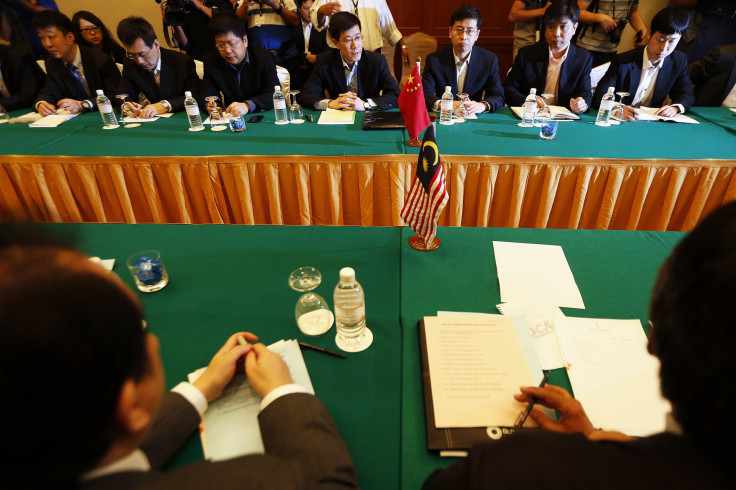Malaysia Criticized For Not Handling The Missing Flight MH370 Situation With More Transparency and Promptness

The Malaysian government's handling of the disappearance of Malaysia Airline (OTCMKTS:MLYAF) Flight MH370, which went missing on March 8, has been criticized by many, including China, who have demanded that it be more transparent in managing the search operations, which entered its sixth day Thursday.
Malaysia, one of southeast Asia's relatively affluent economies that aims to become a developed nation in six years and moved toward competitive elections last May, is known for keeping a tight lid over information regarding government operations, an approach that seems to have backfired in the case of the missing plane and invited worldwide criticism for Prime Minister Najib Razak’s administration, a Bloomberg report said.
“They’re handling a huge global issue as if it was domestic politics,” said Clive Kessler, a professor of sociology and anthropology at the University of New South Wales in Sydney, according to Bloomberg. “With the cause of the (MH370’s) disappearance still unknown you can understand the need for discretion and caution but it is being perceived in Malaysia and elsewhere in the region as a bid to hide the truth.”
The United Malays National Organisation, Razak’s party that runs Malaysia's government, has been accused of giving false leads on the plane’s whereabouts, especially by officials from China, which is home to a majority of the 227 passengers on board the missing aircraft, according to Bloomberg. The Malaysian government has been urged by China, which has stepped up its own search operation, to give a clearer picture of events leading up to Flight MH370's disappearance enroute from Kuala Lumpur to Beijing.
Following MH370’s disappearance on Saturday, Malaysia Airline has also opted out of Boeing's (NYSE:BA) jet-data service, which gives real-time performance details about its planes to carriers, Bloomberg reported Thursday, citing sources.
Chinese Foreign Ministry spokesman Qin Gang reportedly urged “the Malaysia side to enhance and strengthen rescue and searching efforts,” according to Bloomberg.
Meanwhile, local Chinese media have complained at various times during the ongoing search, which now involves 12 countries including the U.S. and India, that there has been a lot of “confusion” regarding the incident and that it is becoming tougher to accurately assess the information being released by Malaysian authorities, which at times have been contradictory in nature.
“The Malaysian side cannot shirk its responsibilities,” the Global Times, a Chinese government-controlled newspaper, said on March 10 in an editorial piece. “The initial response from Malaysia was not swift enough. There are loopholes in the work of Malaysia Airlines and security authorities.”
Transport Deputy Minister Pham Quy Tieu of Vietnam, which also is assisting in the search for the missing plane, expressed concern Wednesday that the search effort was being compromised by Malaysia’s lack of cooperation, which he said “has not been positive,” and reportedly told the media in Hanoi that Malaysian officials did not respond well to requests for information.
However, Acting Transport Minister Hishammuddin Hussein defended his government's approach Wednesday.
“Our immediate focus is to find the aircraft. Unless we get the aircraft and the blackbox, it’s unlikely that we are able to answer a lot of speculative issues that have been raised out there,” he said, according to Bloomberg, adding: "We have been very consistent in what we have been saying in the last few days.”
However, one of the main points of contention remains the plane's last-known location. On Tuesday, Malaysian newspaper Berita Harian quoted Gen. Rodzali Daud, the country's air force chief, as saying that military radar had tracked the jet until two hours after take-off while Malaysian authorities had originally reported that the plane had vanished without a trace about one hour after take-off. Daud soon went on to deny making such a statement, fueling further confusion in a case that has baffled governments, and aviation and defense experts around the world.
Bridget Welsh, a political science professor at Singapore Management University, said according to Bloomberg: “There are big issues -- transparency, information sharing, questions associated with security. They (Malaysian authorities) are not in control of the discussion and the problem is they’re not instilling confidence. Everyone wants to give them the benefit of the doubt but this is a crisis of credibility for the administration.”
The government and Malaysia Airlines, one of the region's biggest carriers with a good safety record so far, have also come in for criticism for not revealing enough details about security lapses that led to the presence on the plane of two Iranian passengers with stolen passports, which have fueled speculation that terrorism could be a cause for the plane's disappearance.
“If it is due to a deadly mechanical breakdown or pilot error, then Malaysia Airlines should take the blame. If this is a terrorist attack, then the security check at the Kuala Lumpur airport and on the flight is questionable,” the Global Times wrote in its editorial.
© Copyright IBTimes 2024. All rights reserved.






















